Ukraine refuses to negotiate with Russia on buying 2 nuclear reactors
(Baonghean.vn) - Ukraine has rejected signing a document with Russia on purchasing a Russian nuclear reactor in Bulgaria.

Ukrainian state energy company Energoatom has announced that it has no plans to sign any documents with Russia regarding the possible purchase of two Russian-made nuclear reactors from Bulgaria.
Earlier, during his recent visit to Bulgaria, Ukrainian President Volodymyr Zelensky discussed with Bulgarian Prime Minister Nikolai Denkov the sale of two nuclear reactors from the unfinished Belene nuclear power plant under construction by Russia to Kiev.
The reactors were purchased from Russia five years ago, but the Bulgarian government could no longer afford them. So the country’s parliament gave the government the green light to start negotiations with Ukraine. However, Sofia’s two pro-Russian parties, the Socialists and Renaissance Party, voted against selling the reactors to Kiev.
At the same time, according to Euractiv, a representative of the European Commission confirmed that the purchase of reactors worth 600 million euros could be carried out at the expense of the European Union.
Ukrainian expert Nikolai Shteinberg, chief engineer of the Chernobyl Nuclear Power Plant in 1986-1987, told the publication Ukrinform that the sale of nuclear equipment and components to another country is considered to be subject to special export controls. Therefore, a license from the manufacturer is required. According to international law, a tripartite agreement between Russia, Bulgaria and Ukraine is required.
Contrary to those statements, Ukraine's Energoatom Company confirmed that the country is not conducting any negotiations and has no plans to sign any documents with Russia.
According to Energoatom, in case of successful negotiations in Sofia, an American company will assist in the installation of the units. At the same time, Ukraine will not depend on Russia for any maintenance of the nuclear reactor equipment.
The Belene nuclear power plant has been controversial since the project began in the mid-1980s. Construction has been halted and resumed several times. Some Western governments objected because the plant would depend on Russian fuel.


